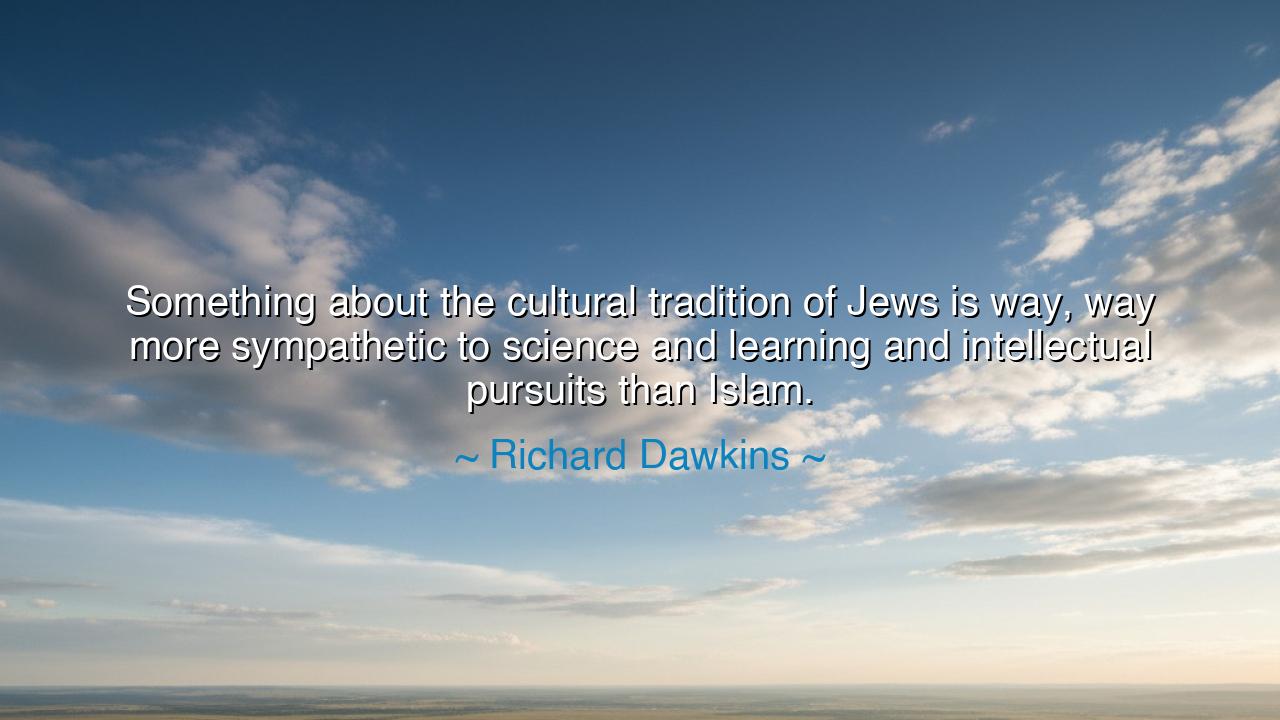
Something about the cultural tradition of Jews is way, way more
Something about the cultural tradition of Jews is way, way more sympathetic to science and learning and intellectual pursuits than Islam.






There are words that stir reflection upon the destiny of whole civilizations, words that weigh not merely upon belief, but upon the very spirit of inquiry that shapes the world. Richard Dawkins, a biologist of piercing intellect and a tireless defender of reason, once said: “Something about the cultural tradition of Jews is way, way more sympathetic to science and learning and intellectual pursuits than Islam.” These words, though controversial, carry within them a challenge — not to compare faiths for the sake of pride, but to examine the deeper relationship between culture and knowledge, between faith and the pursuit of truth. For the measure of any people, in the end, is not how loudly they praise, but how earnestly they seek to understand.
The meaning of Dawkins’s reflection lies in the contrast he draws between cultural attitudes toward learning. He observes that within the Jewish tradition, across centuries of exile and adversity, there grew a powerful reverence for study, questioning, and interpretation. The synagogue became not merely a place of worship but a school of thought; the sacred text was not read in silence but debated, dissected, and reimagined. From the Talmudic scholars of ancient Babylon to the Jewish philosophers of medieval Spain, the act of inquiry itself became a form of devotion. This culture of intellectual reverence gave rise to minds such as Spinoza, Einstein, and countless others who carried the light of rational thought into every field of science and art.
In drawing his comparison, Dawkins also laments what he perceives as a decline of that same intellectual openness within other traditions, particularly within parts of the Islamic world. Yet his observation, if taken wisely, should not be heard as insult, but as lament — for once, the Islamic world was the beacon of learning. During the centuries when Europe slept in darkness, the libraries of Baghdad, Córdoba, and Cairo glowed with knowledge. There, the works of Aristotle, Plato, and Galen were preserved, translated, and expanded upon. The House of Wisdom in Baghdad was a temple to intellect, where Muslim, Christian, and Jewish scholars labored side by side in the name of truth. It was the Muslim polymaths — Alhazen, Avicenna, Averroes — who taught the West how to reason, how to observe, and how to doubt. The loss of that spirit, Dawkins suggests, is not a curse of religion, but of cultural stagnation — when curiosity is replaced by conformity and inquiry by dogma.
The origin of such decline lies not in faith itself, but in the politics of power and the fear of questioning. When empires fell and rulers grew insecure, orthodoxy hardened into armor. The same fire that once fueled discovery was smothered by decree. Yet even within suppression, the ember of curiosity never truly died. The tragedy, as Dawkins sees it, is that where culture ceases to honor learning, it also ceases to grow. The civilizations that once led humanity forward in knowledge are those that revered the scholar as highly as the warrior. But where fear silences thought, the future withers.
To understand Dawkins’s words, one must see beyond comparison and toward cause. Every tradition, whether Jewish, Islamic, Christian, or otherwise, possesses both its scholars and its zealots. What defines their destiny is which voice the culture exalts. The Jewish world, battered yet unbroken by exile, found in study its fortress. The Islamic world, once the cradle of science, must rediscover that same courage — the courage to ask, to reason, to learn. For knowledge is not the enemy of faith; it is faith refined by understanding. The divine does not shrink under the gaze of truth — it is revealed by it.
History offers both warning and hope. When the Jewish scholar Moses Maimonides lived in twelfth-century Córdoba, he studied both the Torah and Aristotle. His philosophy united faith and reason into a single stream of wisdom. He did not fear the old truths meeting the new; he believed that all truth, wherever found, was God’s own. His writings influenced both Jewish and Islamic thinkers, and through them, the Christian scholastics who would lay the foundation for Europe’s Renaissance. Here lies the true message of Dawkins’s words: not division, but renewal — a call for every culture to remember its golden age of inquiry, and to revive it.
Let this be the lesson, then, for all who seek enlightenment: cherish the mind as the holiest gift, and never allow fear to rule where curiosity would lead. Every people, every faith, every age stands at the same crossroad — between reverence and reason, between preservation and progress. If we would see miracles again, let them be the miracles of understanding, born not of superstition, but of discovery. For in every culture that dares to question, truth breathes again — and in that breath, humanity rises.






AAdministratorAdministrator
Welcome, honored guests. Please leave a comment, we will respond soon